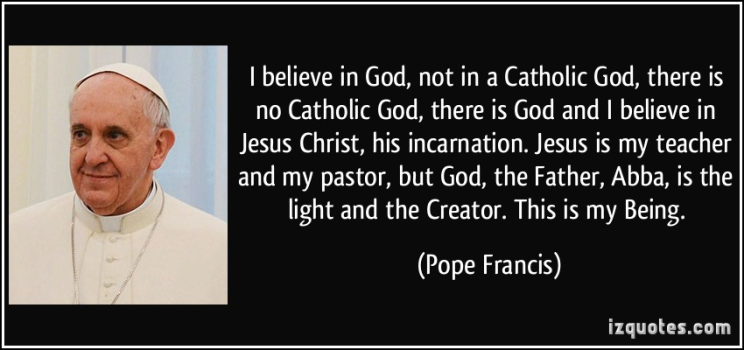Marymog
Well-Known Member
- Mar 7, 2017
- 11,946
- 1,795
- 113
- Faith
- Christian
- Country
- United States
Ummmm....that makes no sense. Can you explain?Well at least the SDA's recognize how the RCC is a counterfeit by it's methodology of outward appearance.
Welcome to Christian Forums, a Christian Forum that recognizes that all Christians are a work in progress.
You will need to register to be able to join in fellowship with Christians all over the world.
We hope to see you as a part of our community soon and God Bless!
Ummmm....that makes no sense. Can you explain?Well at least the SDA's recognize how the RCC is a counterfeit by it's methodology of outward appearance.
Mary was an ordinary young woman. She didn't glory in the fact that God chose her to bring the savior of the world into existence. So that no flesh would glory in his sight.No.
But you used to be Catholic so you should know that already.
No.
But you used to be Catholic so you should know that already.
LET GOD be TRUE but every man a liar . Yet to many its LET THE POPE or their leader be true .





The Apostle Paul gives us the best explanation - 2 Corinthians 11:12-15Ummmm....that makes no sense. Can you explain?
It's a Seventh Day Adventist spin off site, that disagrees with the original SDA, loaded with stupid conspiracy theories that appeal to the uneducated and @Rella likes it.
Which lies of EGW do you call psychotic anti-Catholic nonsense? Put up or shut up.To make matters worse, phoneyman, amigo, David in NU, and others, have hijacked this thread spreading the lies of Ellen G. White, with psychotic anti-Catholic nonsense.
Its not a church 'spin off site' or even affiliated, its a few well meaning members who are a bit rigid, much like the orthodox Hasidic Jews, what can you do...It's a Seventh Day Adventist spin off site, that disagrees with the original SDA, loaded with stupid conspiracy theories that appeal to the uneducated and @Rella likes it. To make matters worse, phoneyman, amigo, David in NU, and others, have hijacked this thread spreading the lies of Ellen G. White, with psychotic anti-Catholic nonsense.
Just as rigid as the LORD Jesus was with those who thought they knew God and Scripture.Its not a church 'spin off site' or even affiliated, its a few well meaning members who are a bit rigid, much like the orthodox Hasidic Jews, what can you do...
Where to begin?View attachment 38411
Which lies of EGW do you call psychotic anti-Catholic nonsense? Put up or shut up.
Speaking of "rigid", have you read this lately = Matthew 5:17-20Its not a church 'spin off site' or even affiliated, its a few well meaning members who are a bit rigid, much like the orthodox Hasidic Jews, what can you do...
The Septuagint (LXX) which is older should have a ranking over the more recent translations.Where to begin?
Please refer to your reply #1109 as I am over 10,000 characters by repeating it here
Does that mean they left out part of the Commandments so that they could indeed covet some things? No. It’s understood that “Thou shalt not covet,” covers all of those things. Just like Catholics understand that, “Thou shalt not have any false gods before me,” means that we should not worship idols, or graven images, as false gods.
| 1 | “I am the Lord your God, who brought you out of the land of Egypt, out of the house of bondage. You shall have no other gods before Me. |
| 2 | “You shall not make for yourself a carved image, or any likeness of anything that is in heaven above, or that is in the earth beneath, or that is in the water under the earth; you shall not bow down to them nor serve them. For I, the Lord your God, am a jealous God, visiting the iniquity of the fathers on the children to the third and fourth generations of those who hate Me, but showing mercy to thousands, to those who love Me and keep My Commandments. |
| 7 | “You shall not commit adultery. |
| 9 | “You shall not bear false witness against your neighbor. |
| 10 | “You shall not covet your neighbor's house; you shall not covet your neighbor's wife, nor his male servant, nor his female servant, nor his ox, nor his donkey, nor anything that is your neighbor's.” |
I hold no regard for the EX Catholic Martin Luther... After all... he was not always an EX.Furthermore, guess who wrote a catechism that had the first and second Commandments exactly the same as the Catholics do? Martin Luther. That’s right, Martin Luther, in his “Small Catechism” (which was a catechism meant primarily for children), listed the first two commandments in the exact same way Catholics do. Yet, do Protestants ever complain about Martin Luther changing the Ten Commandments? I don’t think so.
source
Hello Robert,Mary was an ordinary young woman. She didn't glory in the fact that God chose her to bring the savior of the world into existence. So that no flesh would glory in his sight.
Identification of the pope as Antichrist.View attachment 38411
Which lies of EGW do you call psychotic anti-Catholic nonsense? Put up or shut up.
Not a good look for the Pope, is it?We are not to make idols,--ahem, ahem.
Then 2nd commandment in your book is gone, Sabbath becomes 3rd, and you split the last to not coveting, and not coveting your neighbor's wife, which should be already covered in "Thou shalt not commit adultery." I always thought that was strange.
Who the heck is JACK COTTRELL?Martin Luther on Immersion
Posted on September 30, 2009 by Jack Cottrell
Martin Luther on Immersion
by Jack Cottrell (Notes) on Wednesday, September 30, 2009 at 8:43am
A RECENT QUESTION: Was Martin Luther himself immersed? The question came up at church yesterday in a discussion about Martin Luther’s high view of baptism.
MY REPLY: I do not know the answer to your question. I do know that Luther strongly defended the practice of immersion. E.g., in his treatise, “The Babylonian Captivity of the Church,” printed in “Three Treatises” (Fortress 1960), he says, “The second part of baptism is the sign, or sacrament, which is that immersion in water from which it derives its name, for the Greek ‘baptizo’ means ‘I immerse,’ and ‘baptisma’ means, ‘immersion'” (186). “It is therefore indeed correct to say that baptism is a washing away of sins, but the expression is too mild and weak to bring out the full significance of baptism, which is rather a symbol of death and resurrection. For this reason I would have those who are to be baptized completely immersed in the water, as the word says and as the mystery indicates. Not because I deem this necessary, [!!!] but because it would be well to give to a thing so perfect and complete a sign that is also complete and perfect. And this is doubtless the way in which it was instituted by Christ. The sinner does not so much need to be washed as he needs to die, in order to be wholly renewed and made another creature, and to be conformed to the death and resurrection of Christ, with whom he dies and rises again through baptism” (191). “Baptism swallowed up your whole body and gave it forth again” (192). Here he gives three reasons for immersion: 1) This is what the Greek word means. 2) Only immersion truly portrays physically what is happening spiritually at that time. 3) This is what Jesus himself instituted. In the face of these overwhelmingly convincing reasons, how he can in the same breath say that this is not necessary is completely infathomable. It is an example of how irrational we can become at the temptation of Satan and his demons (1 Tim. 4:1).
Now... do you want to go further into Martin Luther?
I am not making the connection you are trying to give me....but I digress.The Apostle Paul gives us the best explanation - 2 Corinthians 11:12-15
"But what I do, I will also continue to do, that I may cut off the opportunity from those who desire an opportunity to be regarded just as we are in the things of which they boast. 13For such are false apostles, deceitful workers, transforming themselves into apostles of Christ. 14And no wonder! For Satan himself transforms himself into an angel of light. 15Therefore it is no great thing if his ministers also transform themselves into ministers of righteousness, whose end will be according to their works."
Ummmmm.....Your response makes no sense and has NOTHING to do with Catholics NOT looking upon Mary as a goddess. As an ex-Catholic you know this already, but you seem to be content on spreading the lie that we do look at her as a goddess. You baffle me.....The Spirit of God only leads His Children into Truth.
Sanctified Children's Truth 101 - Acts chapter 4 and the Apostle Peter's Instruction
Then Peter, filled with the Holy Spirit, said to them, “Rulers of the people and elders of Israel: If we this day are judged for a good deed done to a helpless man, by what means he has been made well, let it be known to you all, and to all the people of Israel, that by the name of Jesus Christ of Nazareth, whom you crucified, whom God raised from the dead, by Him this man stands here before you whole. This is the ‘stone which was rejected by you builders, which has become the chief cornerstone.’
Nor is there salvation in any other, for there is no other name under heaven given among men by which we must be saved.”
Ummmmm.....Your response makes no sense and has NOTHING to do with Catholics NOT looking upon Mary as a goddess. As an ex-Catholic you know this already, but you seem to be content on spreading the lie that we do look at her as a goddess. You baffle me.....
Shame on you.....

Thank you for that empty and impotent response.THEY were inspired of men , mens wisdom . But you have no idea what i mean . cause if the RCC claims them , YOU CLIAM THEM .
THERE is a big differnce between truths and mixture , verses TRUTH ITSELF .
THE SEVEN were not inspired OF HEAVEN , but of men . THE SIXTY SIX were INSPIRED of heaven and contain no leaven .
I discerned a big difference in the TWO real fast .
I read them with a open mind too . I too wondered WHY , why would a church remove them .
SO with an open mind i read them . THEN UNDERSTOOD I , WHY they had been removed .
ITS NOT LIKE everything those books said were lies . but rather it was mens wisdom to try and put together
something MEN thought might help . WHEN IN TRUTH they dont help but rather lead to something else .
I SEEN WHORE in some of them . things that pointed more to the way the RCC does things
and those things contradicted SOME things the original sixty six had said .
ITs been over fifteen years since i read them .
WHEN i read the sixty six it was not the same as when i was reading the other seven EITHER .
MY ADVICE FOR YOU . GET THE SIXTY SIX WELL LEARNED . READ THEM FOR YOURSELF
four hours daily , learn them well . THEN YOU WILL SEE the DIFFERENCE plain as DAY . JUST like i did .

